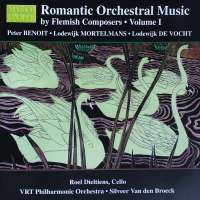|

Flemish Exploration

ROBERT ANDERSON listens to a little-known 'family'
 Four of these composers link closely, being pupils or notable
inspirers of each other. Arthur Meulemans is the odd man out, not having
attended the Royal Flemish Conservatory in Antwerp, where the others taught
and learnt. This Flemish five spans three generations, with Peter Benoit,
born in 1834, the distinguished grandfather. He has a couple of pieces to
his credit, the first a suite from one of his three lyric dramas, in which
the play has continuous orchestral accompaniment and the actors declaim
in rhythm. The subject is the Pacification of Ghent (1576), by which Catholic
and Calvinist Netherlands managed to combine against Spanish soldiery. Beethoven's
Egmont had already lost his head, and the protagonist is William
the Silent. The tercentenary suite has five movements, opening with the
grinding misery of the Dutch as they struggle. The introduction to Act 2
is a love scene between two invented characters; Wagner cannot resist taking
a peep [listen]. William the Silent's movement
begins with strong, lower-string recitative, whereas the Duke of Alba has
a Moorish and exotic touch as he flourishes into Brussels. The final festival
has the operatic panache of Verdi, or maybe Meyerbeer whom Benoit probably
knew better. The delightful In the Fields for oboe and orchestra
on the second disc is an accomplished miniature of great charm. Four of these composers link closely, being pupils or notable
inspirers of each other. Arthur Meulemans is the odd man out, not having
attended the Royal Flemish Conservatory in Antwerp, where the others taught
and learnt. This Flemish five spans three generations, with Peter Benoit,
born in 1834, the distinguished grandfather. He has a couple of pieces to
his credit, the first a suite from one of his three lyric dramas, in which
the play has continuous orchestral accompaniment and the actors declaim
in rhythm. The subject is the Pacification of Ghent (1576), by which Catholic
and Calvinist Netherlands managed to combine against Spanish soldiery. Beethoven's
Egmont had already lost his head, and the protagonist is William
the Silent. The tercentenary suite has five movements, opening with the
grinding misery of the Dutch as they struggle. The introduction to Act 2
is a love scene between two invented characters; Wagner cannot resist taking
a peep [listen]. William the Silent's movement
begins with strong, lower-string recitative, whereas the Duke of Alba has
a Moorish and exotic touch as he flourishes into Brussels. The final festival
has the operatic panache of Verdi, or maybe Meyerbeer whom Benoit probably
knew better. The delightful In the Fields for oboe and orchestra
on the second disc is an accomplished miniature of great charm.
Lodewijk Mortelmans belongs to the next generation (1868-1952). His most
ambitious piece here is a symphonic poem, The Myth of Spring. The
sun-god of the Edda wakes the earth goddess from her snowbound hibernation.
Much of the piece is easygoing in a countryside 12/8, but Wagner can be
relied on to assist the climax. More impressive, though, are the two elegies
of 1917, in response to the death of his wife and two children. This is
music that matters, coming straight from the heart [listen].
It might equally stand for the plight of Flanders in the First World War.
The most effective of Benoit's grandchildren is Lodewijk De Vocht, with
a cello concerto of 1956. It starts gruffly enough, but solo lyricism soon
takes over [listen]. Neoclassical counterpoints
spice the development. The Lento takes a long-drawn cantilena to shape a
movement of grave eloquence. The Maypole tendencies of the finale come as
a disappointment. Such good-natured clod-hopping is unworthy of an otherwise
fine work.
Continue >>
Copyright © Robert Anderson, December
18th 1999
 CD and purchase information
CD and purchase information
 |
To listen to the aural illustrations in this review,
you may need to download RealNetworks' realplayer G2. |
<< Music &
Vision homepage Roberto
Sierra >>
|